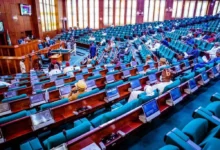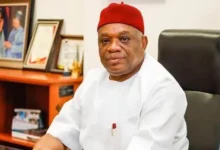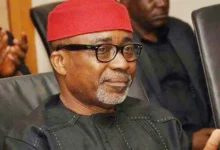
Amaeshi is named head researcher for Uzodimma’s One-kindred-one-business program by a German institute.
The fresh Institute in Hamburg, Germany has selected Prof. Kenneth Amaeshi, Chief Economic Advisor to Imo State Governor Hope Uzodimma, to head up fresh study on the One Kindred One Business Initiative (OKOBI).

Amaeshi
The Imo State government, led by Governor Hope Uzodimma, launched the OKOBI project to address the three economic concerns of “Poverty, Informality, and Employment.”
Amaeshi stated that the research is a one-year initiative to the News Agency of Nigeria (NAN) on Thursday in Abuja.
The research, according to Amaeshi, who holds chairs in sustainable finance at the European University Institute in Italy and business and sustainable development at the University of Edinburgh in the United Kingdom, will examine the OKOBI model and determine how it functions in relation to the social structures of Imo and South-Southeast people.
At the conclusion of the investigation, he stated, the goal was to investigate how comparable systems were handled in other African and global nations while addressing socioeconomic difficulties.
“Some of the owners of OKOBI businesses that are doing well may have to travel to Germany for an exchange program as a result of this project, and this is an incentive for them,” he stated.
Amaeshi also stated that OKOBI was already changing Imo. Amaeshi is a member of the European Commission’s High Level Expert Group on Sustainable Finance for Low and Middle-Income Countries.
Observing the ongoing rise of Homegrown Opportunities for Prosperous Economy (HOPE) in Imo is always energizing and thought-provoking.
“On January 15, 2024, during the commencement of his second term, Governor Hope Uzodimma launched the Community Economic Development Initiative (CEDI), a significant initiative of his government for community sustained socioeconomic development.
He stated, “Among other things, CEDI is anticipated to address the infrastructural obstacles impeding sustainable community economic development in the state.”
Amaeshi stated that Uzodimma mentioned that every community would be required to name one significant project that the government would carry out on their behalf.
He went on to explain that CEDI directly and significantly coincides with the development plan and strategy for sustainable industrialization in Imo, respectively.
He claims that because both CEDI and OKOBI are state initiatives that support, develop, and empower rural community enterprises for increased job creation and growth, they are complimentary.
About 100 firms in Imo State are currently registered under OKOBI, demonstrating the program’s increasing strength since its inception in 2022.
“OKOBI wants to make sure that every kindred has a legally recognized company that can grow, create jobs, and be a part of the global value chain,” he stated.
They would be able to participate actively in the Imo State economy as a result,” he stated.
According to Amaeshi, CEDI is unmistakably an affirmation to enhance OKOBI in different Imo State communities by coordinating infrastructure provision and promoting the economy.
“Stable electricity supply, for instance, will improve and assure power supply and lower manufacturing costs; road network infrastructure will improve market access, linking several localities and stimulating local trade.
He stated, “Internet connectivity will advance the business’s ability to play in the global value chain and enhance access to the international market.”
He said that via CEDI and OKOBI, Governor Uzodimma is setting the standard for inclusive and rural development.
“This is no accident, given the commercial imperatives of OKOBI and CEDI to support the growth of rural enterprises that would revolutionize rural economies.
According to him, both programs will help firms grow by positioning their participants for competition and acting as a catalyst.











